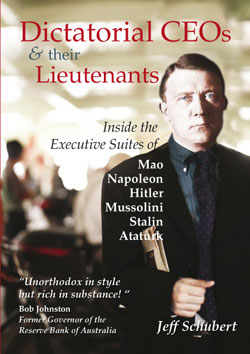Rumsfeld and Stalin as Dictatorial CEOs · 15 April 2006
US Defence Secretary Rumsfeld seems to have some of the dictatorial personality characteristics of Stalin when it come to the management of his fiefdom.
Retired US General DeLong says that “dealing with Secretary Rumsfeld is like dealing with a CEO”: “When you walk in to him, you’ve got to be prepared, you’ve got to know what you’re talking about. If you don’t, you’re summarily dismissed. But that’s the way it is, and he’s effective.”
It sounds like DeLong may have adopted the approach of Politburo member, Lazar Kaganovich, who admitted, that when I go to Stalin, I try not to forget a thing! I so worry every time. I prepare every document in my briefcase and I fill my pockets with cribs like a schoolboy because no one knows what Stalin’s going to ask.
Indeed, DeLong may have given the same advice to his own subordinates as that given by Soviet General Kotliar to Colonel Starinov when the latter was called to see Stalin: Don’t get excited. Don’t think about disagreeing with anything. Comrade Stalin knows everything.
No doubt, when he wants, Rumsfeld has charm. As Sergo Beria, who as a young man had direct official dealings with Stalin, wrote: When he thought it necessary he was able to seduce a Field Marshal just as well as a young man. It was not enough for me to be obedient, I had to be completely with him.
Dictatorial CEOs make sure that they get subordinates who are “completely with” them. Retired US General Swannack, says that Rumsfeld makes sure that he gets the subordinates that he wants: If you understand what Secretary Rumsfeld has done in his time in the Pentagon, he personally is the one who selects the three-star generals to go forward to the president for the Senate to confirm.” Beria wrote that above a certain level in the hierarchy of Party and State Stalin appointed only individuals he knew personally. He sent for them from time to time and never ceased studying them. Before promoting a cadre he spent a long time analysing them. He had one unchanging rule: one can never be too suspicious.
This is not to say that such subordinates are necessarily incompetent. Beria wrote that Stalin had not raised many intelligent people to the rank of his closest associates because he feared that such would hinder his actions. But neither could he allow himself to choose only imbeciles if he wanted results.
Rumsfeld, suggested Retired US General Batiste, has other characteristics that are similar to Stalin: We served under a secretary of defense who didn’t understand leadership, who was abusive, who was arrogant, who didn’t build a strong team.”
Sounds like Rumsfeld wants to dictate from above! Thus, it is not surprising, as Retired US General Newbold wrote, that even though the Iraq war plan was “fundamentally flawed,” many senior officers “acted timidly when their voices urgently needed to be heard. “When they knew the plan was flawed, saw intelligence distorted to justify a rationale for war, or witnessed arrogant micromanagement that at times crippled the military’s effectiveness, many leaders who wore the uniform chose inaction.”
Soviet Marshal Voronov wrote of Stalin’s excessive centralization: It not only robbed one of a great deal of time and prevented one from concentrating on the main thing, but it fettered the initiative of subordinates, slowed things down and lowered efficiency. Stalin could not tolerate the decision of even secondary matters without his knowledge.
In relation to Iraq, Swannack says that Rumsfleld has micromanaged the generals who are leading our forces there. Batiste says: “When decisions are made without taking into account sound military recommendations, sound military decision-making, sound planning, then we’re bound to make mistakes. When we violate the principles of war with mass and unity of command and unity of effort, we do that at our own peril.”


